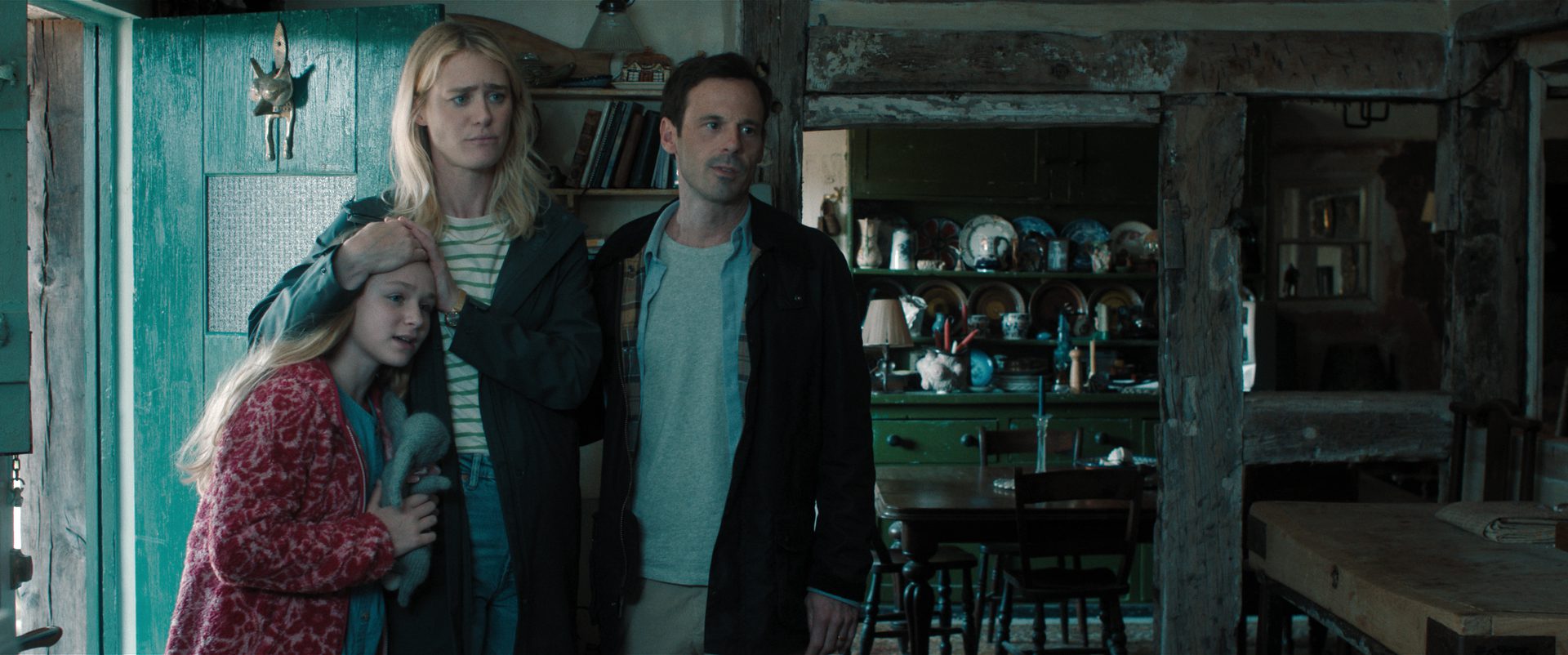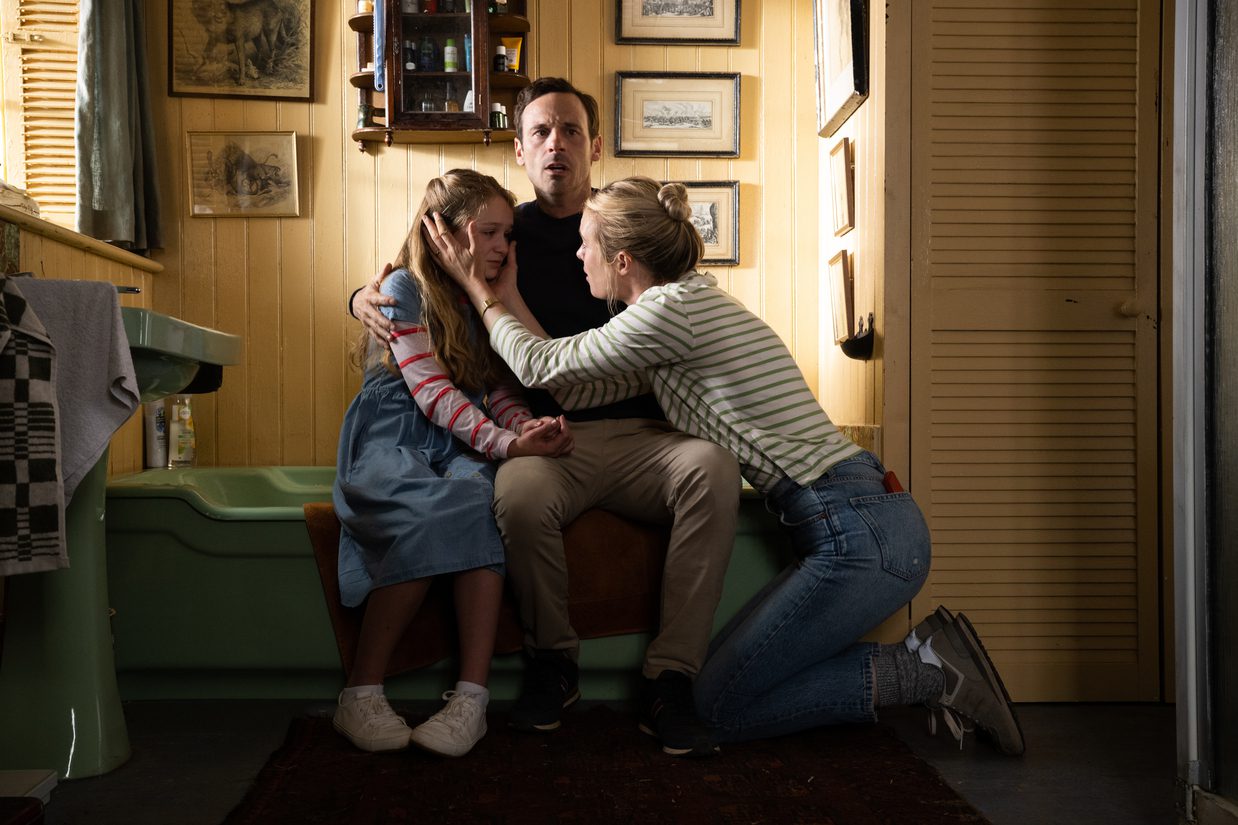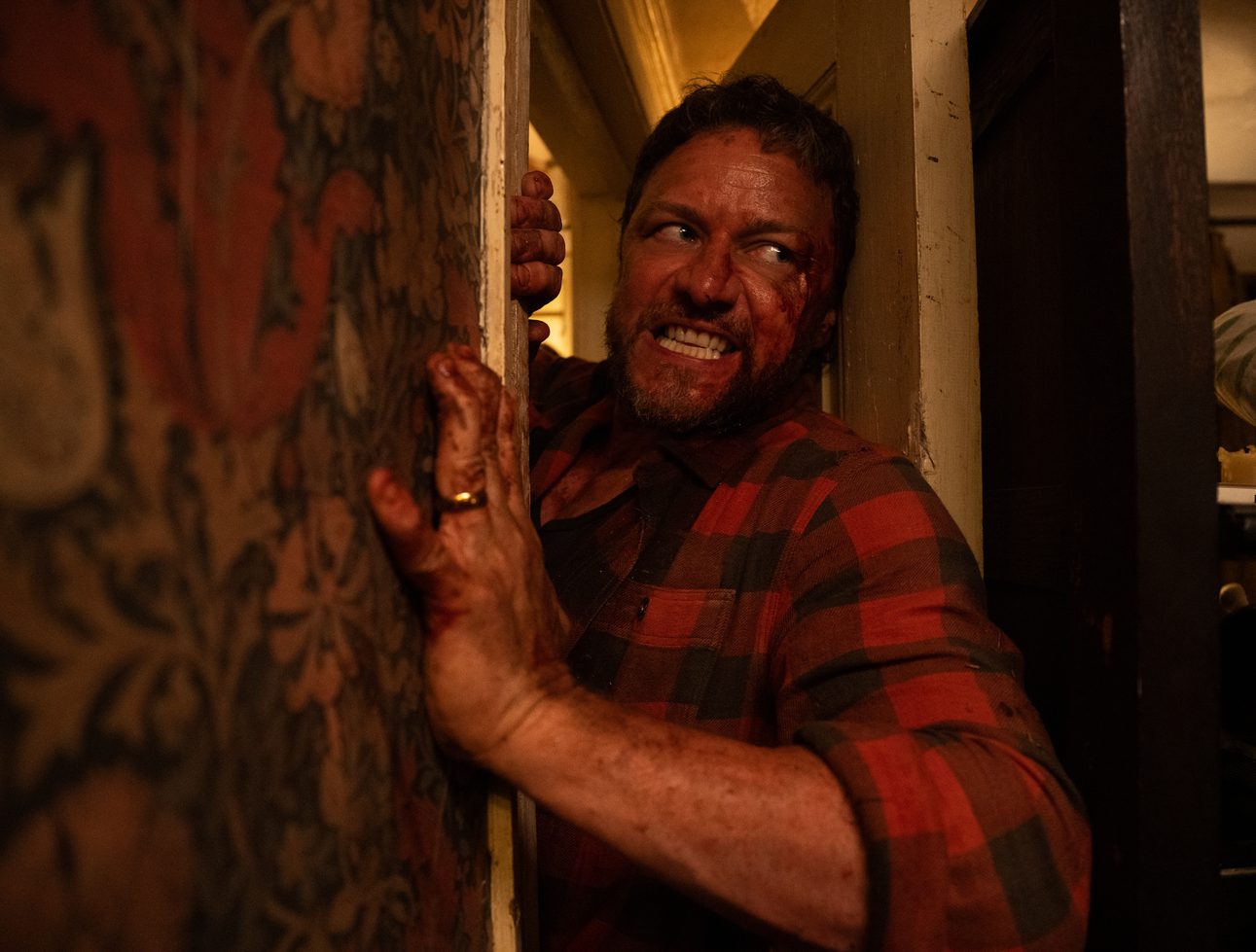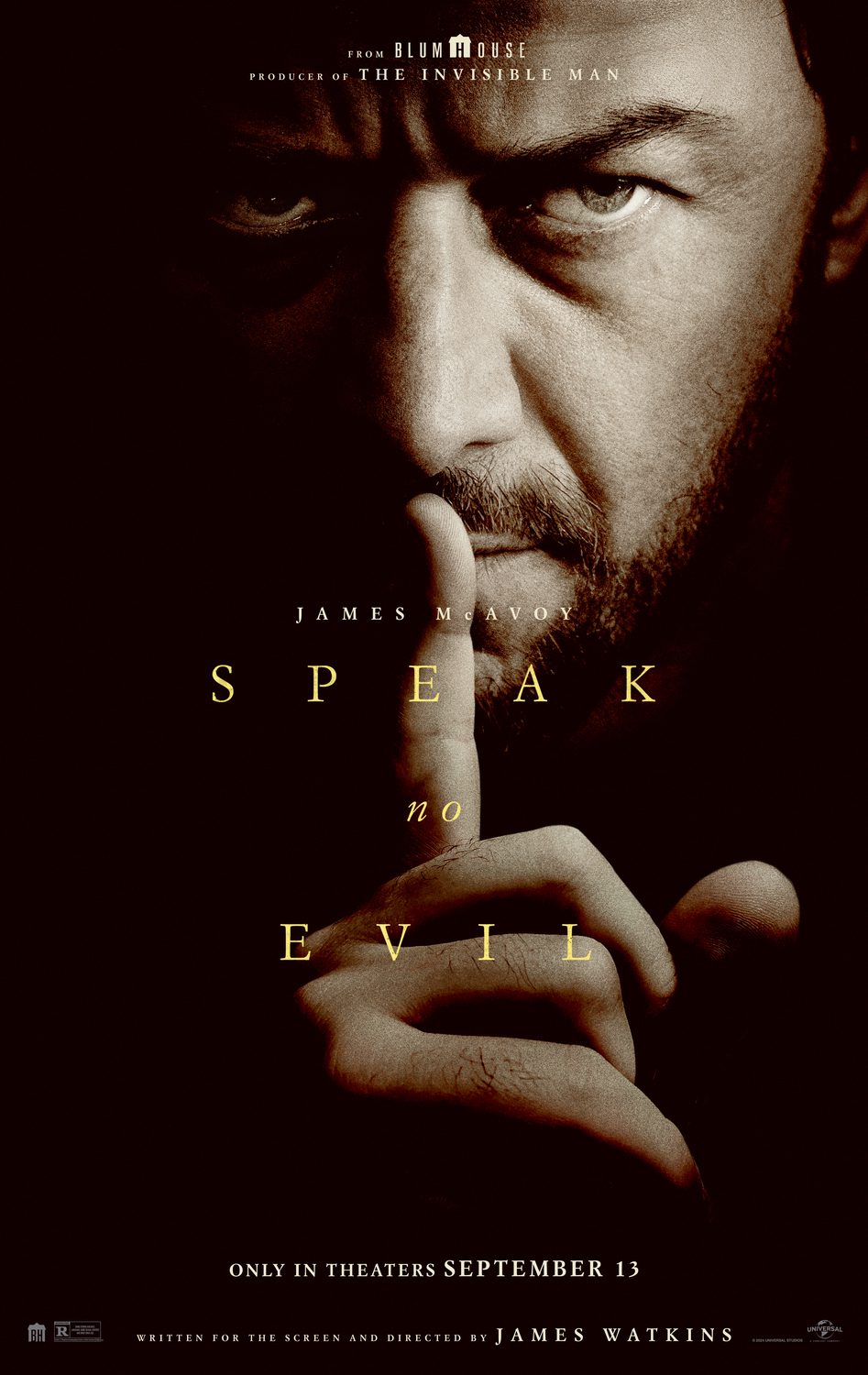
James Watkins’ 2024 remake of the Danish psychological horror-thriller Speak No Evil brings an unsettling atmosphere to the screen while delivering a fresh perspective on the themes of discomfort and human behavior. With an all-star cast led by James McAvoy, Mackenzie Davis, Scott McNairy, and Aisling Franciosi, the film both mirrors its Danish predecessor and manages to carve out its unique path, particularly in its harrowing final act. Watkins (Black Mirror, The Woman in Black), known for his knack for suspense, stays true to the original’s oppressive tone but heightens the tension through meticulous direction and subtle differences that keep the audience on edge.
Table of Contents

A Familiar Story with a Fresh Setting
For those familiar with the 2022 Danish original, Speak No Evil follows much of the same narrative structure. The film centers around a seemingly friendly invitation from an idyllic family to spend a weekend in their remote countryside home. However, as the weekend progresses, the guests begin to sense that something is deeply wrong. Underneath the friendly surface lies something far more sinister.
While the plot stays mostly intact, Watkins’ adaptation brings a more Americanized flavor to the cultural clashes and subtle social tensions that drive much of the unease. The picturesque landscapes and pristine setting of the countryside home juxtapose sharply with the underlying dread that festers throughout the film. The film’s initial warmth and charm fade steadily, giving way to a sense of foreboding that lingers throughout the runtime, thanks to a well-paced build-up that’s neither rushed nor overdone.
James McAvoy Steals the Show
James McAvoy’s portrayal of the villainous host, Paddy, is undoubtedly the film’s standout performance. McAvoy masterfully balances charm and menace, creating a character who can go from affable to chilling in a matter of moments. His ability to blur the line between friendly and fearsome elevates the film’s tension, making him the kind of antagonist that you can’t take your eyes off of, even as his behavior grows more disturbing.
McAvoy’s charisma initially draws the audience in, much like the unwitting family he invites to his home. He plays the role of the perfect host with a welcoming smile, but small, unnerving moments—lingering glances, awkward touches, or words that seem slightly too sharp—reveal something far darker beneath. As the film progresses, Paddy’s behavior becomes increasingly erratic, yet McAvoy never loses the character’s magnetism, making the inevitable descent into chaos all the more terrifying. His performance carries the film, adding layers of complexity to a character who could have easily been one-dimensional in lesser hands.

Mackenzie Davis and Scott McNairy Deliver Quietly Strong Performances
While McAvoy dominates the screen, Mackenzie Davis and Scott McNairy, who play the unfortunate couple on the receiving end of Patrick’s hospitality, offer solid performances as well. Davis excels at portraying an increasing sense of isolation and paranoia, as her character becomes more aware of the unsettling dynamic developing around her. She brings a sense of vulnerability and strength to the role, embodying the emotional toll that such an oppressive environment would take on someone.
McNairy, as her husband, gives a more restrained performance, embodying the denial and rationalization many of us might resort to in an uncomfortable situation. His calm demeanor and desire to avoid conflict play off well against Davis’ growing anxiety, creating a palpable tension between the couple. Together, they make a convincing pair, whose trust and fear fluctuate as the situation worsens.
A Departure from the Original’s Brutal Finality
The original Speak No Evil (2022) shocked audiences with its uncompromisingly bleak ending, which highlighted the devastating consequences of human politeness and our unwillingness to confront danger even when it’s staring us in the face. The Danish version leaves viewers with a harrowing warning about the social pressures that can keep us silent in the face of evil. Its grim conclusion, while powerful, was emotionally draining, leaving little room for hope or redemption.
In contrast, Watkins’ 2024 remake departs from this nihilistic tone in favor of a more emotionally resonant conclusion. By choosing to emphasize the strength and intuition of the film’s mother character (played by Mackenzie Davis), the ending reflects a shift in focus from social critique to a more personal, human story. Rather than succumbing to the fate imposed upon her family, Davis’ character fights back in a way that allows for a sense of victory—however bittersweet. This change gives the audience a cathartic release, even if it doesn’t offer a complete escape from the horror.

Minor Flaws That Hold the Film Back
While Speak No Evil offers a gripping narrative and strong performances, there are a few minor flaws that prevent it from being a perfect thriller. These issues, while small, may distract some viewers from fully engaging with the film’s tension and pacing.
One of the most noticeable drawbacks is the movie’s reliance on certain genre tropes. At times, the story follows predictable beats commonly found in psychological horror films, particularly in the middle section where the unease starts to build. For instance, characters making questionable decisions or ignoring obvious red flags may frustrate seasoned viewers of the genre. The trope of characters staying in an increasingly uncomfortable situation, despite numerous signs of danger, can feel overused, diluting the freshness of the narrative.
Additionally, some viewers might find the film’s pacing in the second act a bit sluggish. While Watkins effectively builds tension through discomfort and awkward social interactions, there are moments where the story drags, leading to a sense that the film is biding time before the inevitable final act. A slightly tighter runtime or additional plot development during these lulls could have heightened the overall suspense.
Final Thoughts: A Worthy Remake with Stellar Performances
Speak No Evil (2024) may follow closely in the footsteps of the Danish original, but James Watkins’ direction and James McAvoy’s captivating performance make it a worthy remake in its own right. McAvoy’s portrayal of the charmingly sinister Paddy is unforgettable, while the supporting cast elevates the film’s tension with grounded, relatable performances. Though the film’s final act diverges from its source material, the fresh approach gives it a unique identity that will likely stay with viewers long after the credits roll.
Overall, Speak No Evil stands as a tense, unnerving thriller that explores the uncomfortable intersections of hospitality, politeness, and malevolence, reminding us just how easy it is to ignore the warning signs of danger when we’d rather not confront them.
About Speak No Evil (2024)
Synopsis: A family is invited to spend a whole weekend in a lonely home in the countryside, but as the weekend progresses, they realize that a dark side lies within the family who invited them.
Director: James Watkins
Writers: James Watkins, Christian Tafdrup, Mads Tafdrup
Cast: James McAvoy, Mackenzie Davis, Scoot McNairy, Aisling Franciosi
Rated: R
Runtime: 1h 50m
Releases: September 13, 2024

he/him • aapi • intj • geek • photographer • journalist • podcaster • martial artist • foodie • dj • cinephile • gamer • traveler




























